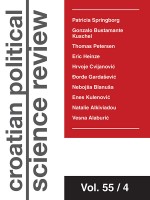Thomas Hobbes and the Political Economy of Peace
Thomas Hobbes and the Political Economy of Peace
Author(s): Patricia SpringborgSubject(s): International relations/trade, Political economy, Peace and Conflict Studies
Published by: Fakultet političkih znanosti u Zagrebu
Keywords: Hobbes; War and Peace; Empire; International Relations; Realism; Bobbitt;
Summary/Abstract: Thomas Hobbes’s theory of war is currently being re-examined as part of a re-examination of realism in international relations theory which claims to be Hobbes-based. I am not alone in maintaining that Hobbes was first and foremost a peace theorist, rejecting the usual grounds for war, pretexts based on just war, infringements on property or trade, and thus trespass. But those who examine the three-fold causes of war that Hobbes gives, as “competition”, “diffidence”, and “glory”, have generally not noticed the relation between Hobbes’s theory of war and empire. While Hobbes makes remarkably few references to the colonial ventures of Great Britain, for reasons that we will consider, his theory of empire, like his theory of war, is based on classical notions of internal balance and the homeostasis of the body politic along Aristotelian lines. His treatment of the polity as a natural body is consistent with his materialist ontology and he treats war and empire in terms of both “intestine diseases” and pathologies that afflict the body politic from without. The upshot is a theory remarkably backward-looking in terms of its emphasis on the health of the body politic and the politics of balance, which forbid “vain-glorious wars” and demand that overly-powerful subjects, towns of “immoderate greatness” and grandiose enlargements of dominion be excised, like Aristotle’s “big foot” whose disproportion spoils the proportion of the body as a whole.
Journal: Politička Misao
- Issue Year: LV/2018
- Issue No: 04
- Page Range: 9-35
- Page Count: 27
- Language: English

